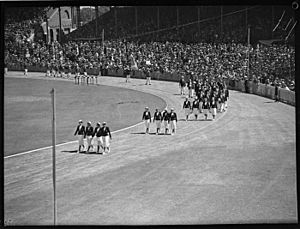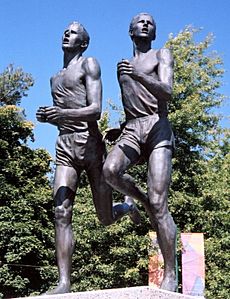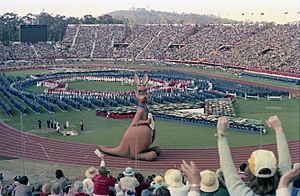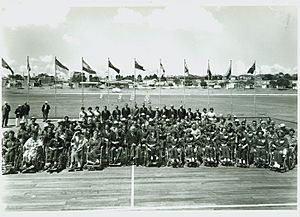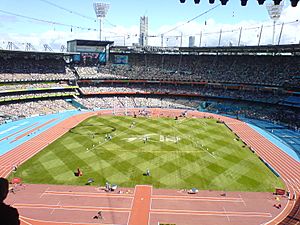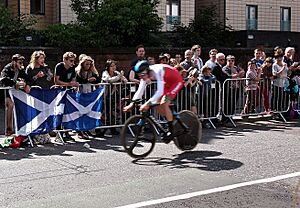Commonwealth Games facts for kids
Quick facts for kids Commonwealth Games |
|
|---|---|
 |
The Commonwealth Games is a major international sports competition held every four years. It brings together athletes from the Commonwealth of Nations. This is a group of countries, most of which were once part of the British Empire.
The event started in 1930 as the British Empire Games. Over the years, its name changed to reflect the world's changing politics. It became the British Empire and Commonwealth Games in 1954, and the British Commonwealth Games in 1970. Since 1978, it has been known as the Commonwealth Games.
The Commonwealth Games Federation (CGF) is in charge of the Games. They decide which sports will be included and choose the host cities. The Games have special traditions, like the Queen's Baton Relay, where a baton with a message from the Head of the Commonwealth travels around the world.
What makes these Games special is their focus on being inclusive. Since 2002, athletes with a disability compete as full members of their teams. In 2018, the Games had an equal number of medal events for men and women, a first for a major multi-sport event. The Games also feature popular Commonwealth sports like netball, lawn bowls, and squash.
A total of twenty cities in nine countries have hosted the Games. Australia has hosted the most, with five times. The most recent Games were in Birmingham, England, in 2022. The next Games are planned for Glasgow, Scotland, in 2026.
Contents
History of the Games
The idea for a sports festival for the British Empire came from John Astley Cooper in 1891. He wanted to create an event to build friendship across the Empire. His idea helped inspire the modern Olympic Games.
In 1911, an Inter-Empire Championship was held in London to celebrate the coronation of King George V. Teams from places like Canada, Australia, and the United Kingdom competed in sports like athletics, boxing, and swimming.
The first official Games, called the British Empire Games, were held in 1930 in Hamilton, Canada. This was thanks to the efforts of a Canadian journalist named Melville Marks Robinson. Eleven teams with 400 athletes took part.
Today, 74 teams compete in the Games. These teams are from the 56 countries in the Commonwealth, plus some territories. Six teams have been to every single Commonwealth Games: Australia, Canada, England, New Zealand, Scotland, and Wales.
Early Games: The British Empire Era
- 1930, Hamilton, Canada: The very first Games! 400 athletes from 11 countries competed. Women only competed in swimming and diving events.
- 1934, London, England: These Games were moved from Johannesburg, South Africa, due to concerns about how athletes of color would be treated. Sixteen teams participated.
- 1938, Sydney, Australia: This was the first time the Games were held in the Southern Hemisphere. 464 athletes from 15 nations took part.
- 1950, Auckland, New Zealand: After a 12-year break because of World War II, the Games returned. Twelve countries sent 590 athletes.
A New Name and a Famous Race
In 1954, the event was renamed the British Empire and Commonwealth Games.
The 1954 Games in Vancouver, Canada, featured a famous race called the "Miracle Mile." Both the winner, Roger Bannister of England, and the runner-up, John Landy of Australia, finished the mile race in under four minutes. It was a huge moment in sports history and was broadcast live on TV around the world.
The 1958 Games in Cardiff, Wales, introduced the Queen's Baton Relay. In this tradition, a baton carrying a message from the Queen travels from Buckingham Palace to the opening ceremony.
The British Commonwealth Games
The name changed again in 1970 to the British Commonwealth Games.
The 1970 Games in Edinburgh, Scotland, were the first to use metric measurements (like meters and kilograms) instead of imperial ones (like yards and pounds). Queen Elizabeth II also attended for the first time as Head of the Commonwealth.
The 1974 Games in Christchurch, New Zealand, were called "The Friendly Games." After the tragic events at the 1972 Munich Olympics, security for athletes and fans became a top priority.
The Modern Commonwealth Games
Since 1978, the event has been called the Commonwealth Games.
- 1986, Edinburgh, Scotland: These Games faced a boycott by 32 nations. They were protesting against the UK's sporting links with South Africa, which at the time had a system of racial segregation called apartheid.
- 1998, Kuala Lumpur, Malaysia: For the first time, the Games were held in Asia. Team sports like cricket, rugby sevens, and netball were added, which made the Games even more popular.
- 2002, Manchester, England: These Games were part of Queen Elizabeth II's Golden Jubilee celebrations. They were the largest Games in history at the time, with 281 events in 17 sports.
- 2010, Delhi, India: This was the first time the Games were held in India. The host nation had its best performance ever, finishing second in the medal count.
- 2014, Glasgow, Scotland: Hailed as "the standout games in the history of the movement," these Games were praised for their great organization and enthusiastic crowds.
- 2018, Gold Coast, Australia: A historic moment for equality, these Games were the first major multi-sport event to have an equal number of medal events for men and women.
- 2022, Birmingham, England: These were the last Games held during the reign of Queen Elizabeth II.
Special Versions of the Games
Commonwealth Paraplegic Games
From 1962 to 1974, a separate event called the Commonwealth Paraplegic Games was held for athletes with disabilities, usually those with spinal injuries. These Games were held in the same country that hosted the main Commonwealth Games.
In 1994, events for athletes with a disability were added to the main Commonwealth Games. Since 2002, these athletes have been fully included as members of their national teams, and their medals count towards the final tally.
Commonwealth Youth Games
The Commonwealth Youth Games are for young athletes aged 14 to 18. The first Youth Games were held in Edinburgh, Scotland, in 2000. They give young people a chance to experience a major multi-sport competition.
Traditions and Ceremonies
Opening Ceremony
The opening ceremony is a big celebration that kicks off the Games. It includes a parade of all the athletes, who enter the stadium country by country. The host nation performs last. The ceremony features music and dance that showcases the host country's culture. The highlight is the arrival of the King's Baton. The final runner gives the baton to the Head of the Commonwealth (or their representative), who reads the message inside to officially open the Games.
Closing Ceremony
The closing ceremony happens after all the sports are finished. The athletes enter the stadium together in a big group, showing the spirit of friendship. The Commonwealth Games flag is passed to the mayor of the city that will host the next Games. At the end, the David Dixon Award is given to an outstanding athlete for their performance and sportsmanship.
Sports at the Games
The Commonwealth Games features a mix of core sports that are part of every Games and optional sports chosen by the host city.
Some of the core sports include:
- Athletics
- Badminton
- Boxing
- Hockey
- Lawn bowls
- Netball (for women)
- Rugby sevens
- Squash
- Swimming
- Weightlifting
The Games also include many para-sports, which are events for athletes with a disability. These are integrated into the main sports program.
Who Competes in the Games?
Only six teams have competed in every single Commonwealth Games since 1930:
- Australia
- Canada
- England
- New Zealand
- Scotland
- Wales
Australia has been the top team on the medal table 13 times, while England has been on top 7 times.
Some territories that are not independent countries also compete, such as the four Home Nations of the United Kingdom (England, Scotland, Wales, and Northern Ireland), the Crown Dependencies (like Jersey and the Isle of Man), and several British Overseas Territories.
See also
 In Spanish: Juegos de la Mancomunidad para niños
In Spanish: Juegos de la Mancomunidad para niños
 | Misty Copeland |
 | Raven Wilkinson |
 | Debra Austin |
 | Aesha Ash |


